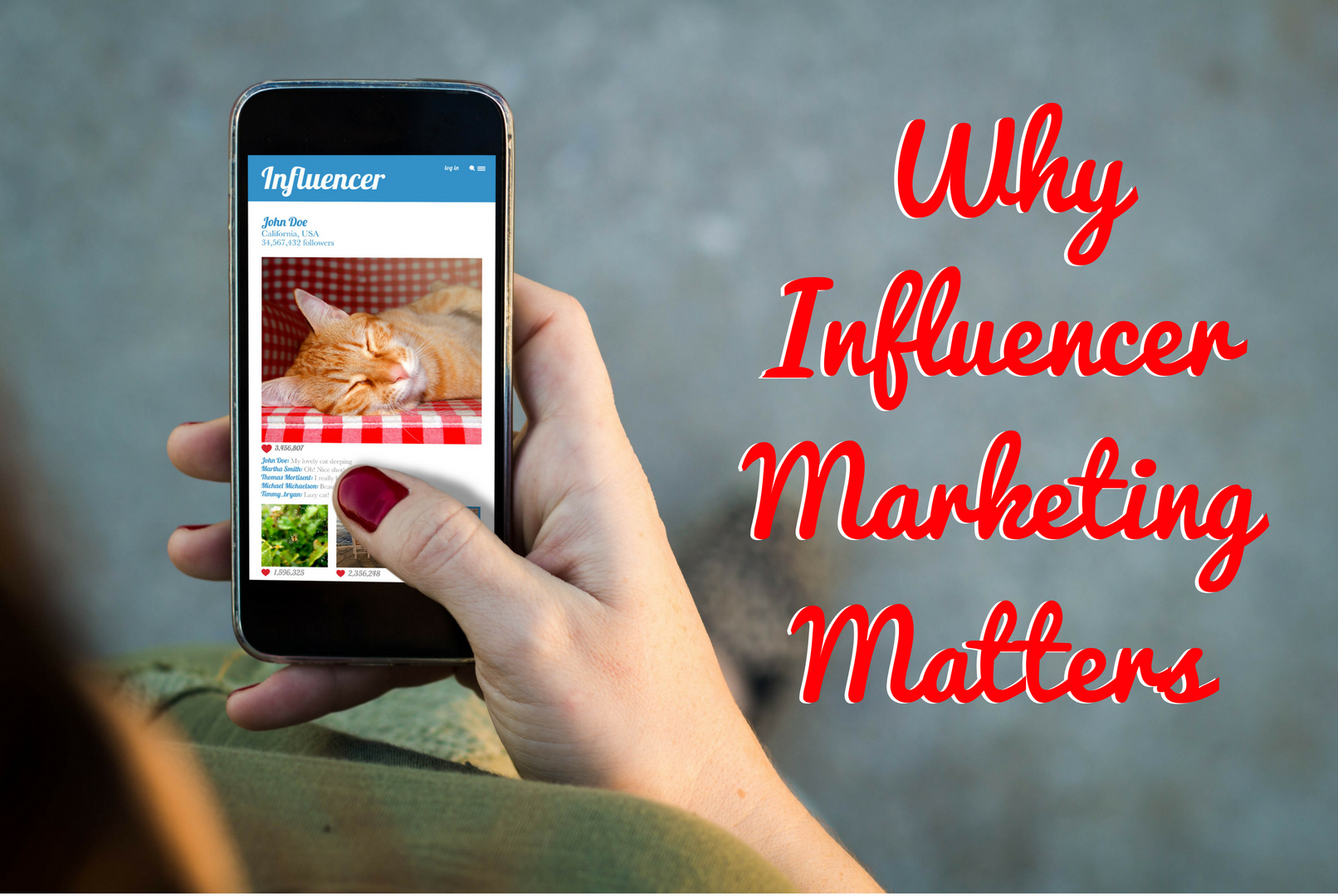A few months ago, we touched briefly on one of 2018’s hottest marketing trends: influencer marketing. In the golden age of social media, your target audience is more likely to listen to the opinion of their favorite social media star than a stuffy traditional advertisement.
Influencer marketing is a sweet hybrid of old and new marketing methods. Take the idea of a celebrity endorsement and translate it into the mobile age. A post on social media feels organic and authentic, unlike traditional forms of advertising, which can seem obnoxious. Pewdiepie, Cameron Dallas, Logan Paul, Zoella – these names may not mean anything to you, but these online creators have amassed an audience of millions of people across platforms like YouTube and Instagram. In fact, the top 25 social media influencers have a collective 890 million online followers.
Influencer marketing is still a relatively new concept in the marketing industry, but the strategy is projected to grow 500% by 2021. You don’t want to get left with an outdated marketing strategy! So how can you incorporate this new type of marketing into your own business’ approach? Keep reading for the answers to all your influencer-related questions.
What is Influencer Marketing?
As we previously discussed, influencer marketing is the process of collaborating with a person who has a strong social media presence. It allows you to drive your message to a larger audience organically. Rather than advertising directly to your target audience, you pay a social media influencer to communicate the message on your behalf. Gen Xers are eager to skip through a 30-second ad before a 10-minute-long sponsored YouTube video. In fact, 71% of consumers are more likely to make a brand purchase based on a social media reference than an ad. People trust the opinions of their favorite online personalities over a traditional advertisement from a corporation. When you align your brand with an influencer, they bring not only their audience but their audience’s network as well. This gives the influencer the ability to drive traffic to your website, increase your social media exposure, and market your product through their own personal testimony.
You can choose to collaborate on any social media platform, though YouTube and Instagram are the two most popular. The visual-based media naturally lend themselves to advertising via influencer marketing. You might also research influencers on Snapchat, Twitter, Twitch, Musical.ly – the possibilities are endless! With new social media platforms popping up all the time, there are always new ways to reach a wider audience.
Each social media platform has its unique strengths. YouTube allows for long-form video, Instagram is great for staged photos, Snapchat makes product placement feel organic, etc. Research which platform is best suited for the type of content you want to broadcast. Consider aspects such as unique users and demographic makeup when conducting your research.
How Can I Incorporate Influencer Marketing Into my Business’ Strategy?
After you’ve decided on a platform to market towards, your next step is to identify influential social media users who would be interested in your product. Forbes recommends targeting influencers with 100,000 followers or more, though that number is not set in stone. The number one variable to prioritize is engagement – you don’t want to be advertising to an uninterested audience! When an influencer has a high engagement rate, it means their followers are paying attention and interacting with their content. The perfect social media collaborator will have the reach, relevance, and authority to market your product effectively. There are tools you can use to find effective influencers such as Buzzsumo, Social Mention and Follwerwonk. These websites can help you quantify the influence of potential social media collaborators.
Though follower count is important, finding an influencer who is an embodiment of your brand is far more crucial. While a person with hundreds of thousands of followers could certainly expose your brand to their audience, that effort would be in vain if the influencer is not the right fit for your company. You wouldn’t contact a beauty guru to market your body-building protein powder, even if their social media metrics are appealing. Your sponsored post will be moot if it’s broadcast to the wrong audience. As a business owner, you probably already have a good idea about the type of audience you want to reach. Use that audience as a starting point to select the perfect social media star for your influencer marketing campaign. To locate the best person for the job, think about the types of social media profiles your audience would follow.
Once you’ve identified the influencers you want to start a relationship with, the next step is figuring out exactly how they can help you. This could be as simple as an Instagram tag or as grand as a full-blown advertising campaign. Here are some quick ideas for ways you can market with a social media influencer:
- Ask them to write a guest post for your blog
- Have them conduct a sponsored giveaway with their followers
- Ask them to review your product, whether that be in writing or in video
- Ask to be featured on their Snapchat or Instagram story (due to the impermanent nature of the story, this is a cheaper option compared to a permanent post)
Get creative! Influencers make imaginative content for a living. Allow them to put their unique spin on your content. After all, their unique voice is how they got all those followers in the first place. Sure, you could write out a script for a sponsored video, or micro-manage every paid Instagram caption, but where’s the fun in that? Professional influencers will work with you to find a balance between your message and their personal content.
How Much Will Influencer Marketing Cost?
Perhaps the most important question of all, “How much will this new marketing strategy cost me?” This question has no singular answer. The cost of each influencer has many variables, from the size of their audience, to engagement rates, to frequency of posting and more. Sponsorship rates vary widely among influencers but the market will likely stabilize in a few years as the practice becomes more common.
One of the best things about influencer marketing is that is accessible to businesses of all sizes. Gone are the days of shelling out thousands of dollars for a billboard or 30-second TV commercial. With influencer marketing, small and mid-sized businesses are given the opportunity to level the playing field. Adweek estimates that the average sponsored Instagram post will set you back $300. A profile with more than 100,000 followers averages about $800 for the same post. As a rule of thumb, many digital marketers adhere to the rule of “one cent per follower,” though that is only a starting point for their calculations. You can reach out to the influencer directly to discuss their rates. Established accounts will often have predetermined rates, while less prominent accounts might be more flexible.
Of course, there’s always the option to go big; some companies have paid up to half a million dollars to get a post on Kim Kardashian’s 112-million-follower Instagram page. Celebrity social media posts are astronomically expensive, but the products endorsed by people like the Kardashians often sell out immediately, so brands are almost guaranteed a return on their investment. Compare this figure to advertisers who spend upwards of $5 million for a 30-second ad during the Super Bowl to reach 100 million viewers, who may not even be a part of their target audience. When you look at it this way, the $500,000 Kim K Instagram post may seem more cost-effective.
But have no fear: you don’t need to spend big bucks to get results with your influencer marketing campaign. For example, a sponsored collaboration with a niche Youtuber can be effective without breaking the bank. Smaller influencers are often willing to shout out a brand in exchange for free product. If you’re on a budget, look for smaller influencers who have an active audience in your target market. There are always new people joining the social media sphere, so you’ll never have a shortage of potential business partners. Approach them like you would any media pitch. Describe what makes your product or service unique and offer them something in return, whether that is money or free product. Just like a media pitch, you may not receive a response from every single influencer. Don’t be discouraged! Popular influencers can receive hundreds of requests per year. Sometimes your product might not be the right fit.
Influencer marketing will soon become an essential component of a well-rounded marketing strategy. There is no denying the powerful potential of a social media influencer campaign. To ensure the success of your influencer partnership, focus first on finding your target market and look to the social media platforms they interact with. Find your influencer partner from there. Marketers are seeing influencer content consistently outperform traditional brand-generated content.
This style of marketing is only projected to increase in the coming years. Are you interested in learning more about what influencer marketing can do for your business? Contact us today for a free consultation.



